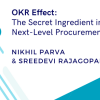Using Procurement Analytics to Become an Agent of Change
The role of procurement is changing. Okay, I know – you’ve heard that before. But after the events of 2020 and the ongoing repercussions, that change has been hugely accelerated.
Increased market volatility and a high risk of supply chain disruption have placed pressure on procurement teams to maintain profitability, better manage working capital, mitigate third-party supplier risks and drive business sustainability. As a result, those teams are playing a more central and strategic role in their organizations.
This role requires the latest tools, technologies and insights to succeed. And at the forefront of those technologies is procurement analytics.
The Changing Role of Procurement
It’s hard to find many positives in a global pandemic. But for procurement teams, the last year’s events have seen the function elevated to a new standing in many organizations.
Departments are now expected to drive value beyond savings. They are responsible for effectively managing category and supplier risk, guiding supplier-enabled innovation, ensuring organizational agility, and steering digital adoption and sustainability initiatives.
During a recent webinar we hosted on how procurement leaders become an agent of change, attendees echoed these sentiments. When asked about the top three impacts on their business environment, we saw a relatively even spread across a range of drivers:
- Budget pressure to recover profitability and preserve cash – 64%
- Higher risks of supply chain disruption – 55%
- Changing ways of working – 52%
- Increased market volatility and complexity – 51%
- Drive for sustainability – 43%
- Skills evolution – 32%
At the heart of each of these demands, whether it’s reducing risk or improving profits, is the need for insight-led procurement. And that’s where procurement analytics comes in.
What is Procurement Analytics?
Simply put, procurement analytics is the process of turning data into actionable insights to address procurement priorities.
At its most basic level, procurement analytics can help us make data-driven decisions to better manage spend and supply chain risks among other things. But there’s a great deal more to it than that. There are four stages of procurement analytics maturity that make up a roadmap for change, from the basic use of data to more advanced modeling and insight.
- Data management – The first step of a procurement analytics journey is to build a robust and standardized repository of data that can provide insight into your organization’s purchasing.
- Descriptive analytics – Descriptive analytics can then help you understand the story that data tells and provide insight into real-time reporting metrics and KPIs.
- Diagnostic analytics – Using external and internal benchmarks, category levers, and risk and root-cause analysis, you can then begin to understand precisely why these things are happening.
- Prescriptive and predictive analytics – Finally, using predictive and prescriptive analytics alongside forecasting and simulation models, you can gain insight into what will happen next – and optimize strategies to get ahead of the game.
Roadblocks, Key Considerations and Readiness
During our recent webinar, only 9% of attendees said they’re currently implementing predictive and prescriptive analytics. And 29% said they were still largely focused on spend analytics.
So, what’s slowing adoption? Most organizations are aware of the value of analytics – more on that later – but they often struggle with data-, insight- and adoption-related challenges.
There are four common obstacles:
- Lack of quality data – Any analytics solution is only as good as the data that fuels it. But many organizations struggle to access clean and reliable data from the numerous systems across their IT landscape.
- Legacy technology – Obsolete tech, including the multiple, home-grown custom ERP systems that many Procurement organizations rely on can also prove a substantial barrier to actionable insight. Even today, many procurement functions rely heavily on spreadsheets, which makes extracting data a mammoth challenge.
- Insufficient support – For analytics projects to work, you need the proper support and funding. But convincing stakeholders and proving ROI can be difficult. That said, there’s perhaps never been a better time to put a business case together than right now.
- A shortage of talent – Finally, driving effective analytics requires relevant skills. But a shortage of talent can make those skills hard to come by.
Are You Ready for Procurement Analytics?
With these factors in mind, it’s essential to assess your readiness before embarking on any procurement analytics project. You need to evaluate the current level of technology adoption in your organization, and whether your team is tech-savvy enough to adapt to new technologies quickly.
From a business perspective, you need to consider whether or not you have the stakeholder buy-in and company culture required to adapt to change and relinquish outdated practices and technologies.
Finally, you need to have the right policies and processes in place to support the adoption of your analytics strategy.
Check out our webinar on-demand to learn more about each of these projects, and get a 10-point checklist to ensure success in your own analytics journey.








